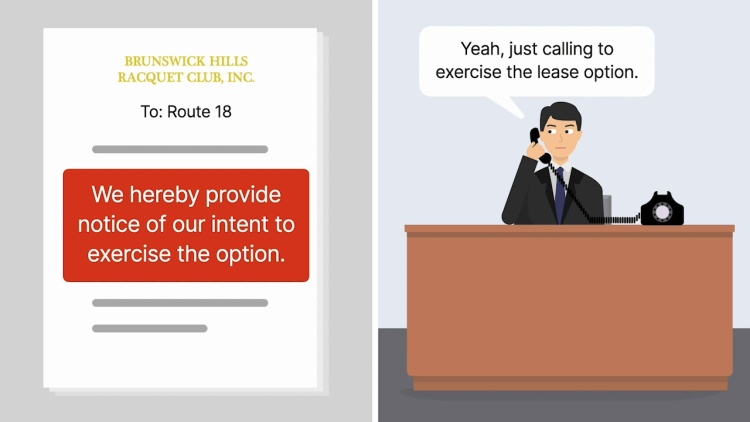Brunswick Hills Racquet Club, Inc. v. Route 18 Shopping Center Associates
New Jersey Supreme Court
182 N.J. 210 (2005)
- Written by Craig Conway, LLM
Facts
Brunswick Hills Racquet Club, Inc. (Brunswick Hills) (plaintiff) operated a tennis club on property is leased from Route 18 Shopping Center Associates (Route 18) (defendant). The lease agreement contained an option allowing Brunswick Hills to either purchase the property or to enter into a 99-year lease agreement. If it chose to exercise the option Brunswick Hills was required to pay $150,000 and to notify Route 18 six months before the expiration of the original lease term. Brunswick Hills timely and repeatedly over a two-year period provided written and verbal notice to Route 18 of its intention to enter into the 99-year lease, but never tendered the $150,000. Long after the option had expired, Route 18’s attorney rejected Brunswick Hill’s offer. Brunswick Hills filed suit against Route 18 seeking damages and to compel specific performance of the option. After a bench trial, the court held in favor of Route 18, noting that the contract clearly required Brunswick Hills to exercise the option and to pay the $150,000 in a timely manner. Brunswick Hills appealed. The appellate division affirmed the judgment of the trial court, noting that Brunswick Hills failed to act in “strict accordance” with the contract terms governing the option. The Supreme Court of New Jersey granted certiorari to review.
Rule of Law
Issue
Holding and Reasoning (Albin, J.)
What to do next…
Here's why 911,000 law students have relied on our case briefs:
- Written by law professors and practitioners, not other law students. 47,100 briefs, keyed to 997 casebooks. Top-notch customer support.
- The right amount of information, includes the facts, issues, rule of law, holding and reasoning, and any concurrences and dissents.
- Access in your classes, works on your mobile and tablet. Massive library of related video lessons and high quality multiple-choice questions.
- Easy to use, uniform format for every case brief. Written in plain English, not in legalese. Our briefs summarize and simplify; they don’t just repeat the court’s language.





